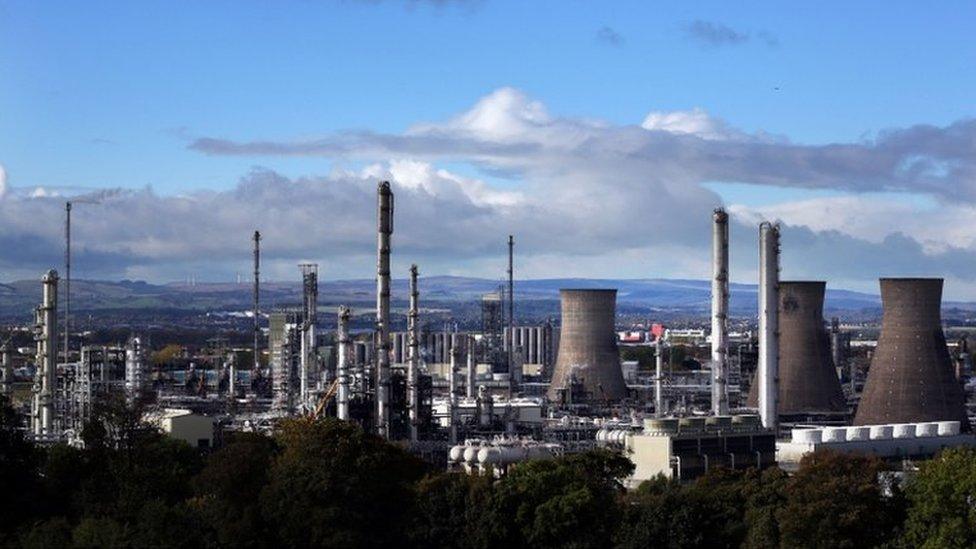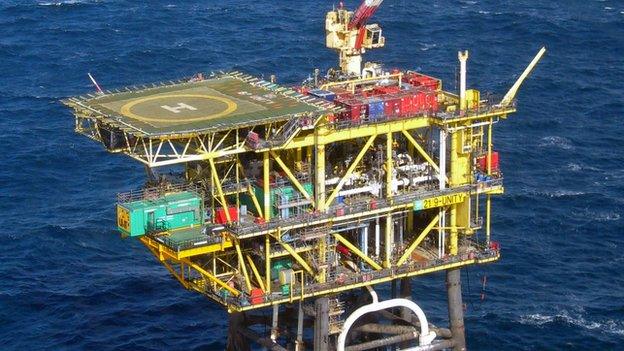When pipelines call the tune
- Published

The pipeline carries oil to facilities adjacent to the Ineos-owned Grangemouth refinery and chemical plant
Deals done in the offshore oil industry are, generally, a good sign.
They signal that there are still buyers who think they can get more value than existing owners out of these maturing assets, and still have enough left over to pay for decommissioning.
That releases capital for the existing owner to invest upstream.
Following its Gulf of Mexico explosion and spill, BP hastened the pace of its shift from refining and mid-stream operations such as pipelines operations - leading to the £200m deal struck between BP and Ineos.
The oil major wants to deploy its capital resources where it thinks it can get most return by specialising in what it does best - big scale, technically-demanding new fields, such as those west of Shetland.
Ineos thinks it can extract more economic value out of older assets being put on the market by the majors.
Not too old at Forties
Given a finite and long-term, declining amount of demand, that either means cutting costs or boosting prices. The possibility of the latter is already concerning Unite the Union, which was humiliated when it tried to confront Ineos chairman Jim Ratcliffe in a 2013 strike.
The threat of higher prices will be watched closely by the Oil and Gas Authority, the new regulator. It has been given a specific remit to ensure that competitive pressures between offshore operators are suppressed in favour of "maximising economic recovery" of reserves.
Ineos bought Grangemouth refinery and petro-chemical plant, and invested a lot in new facilities to import ethane from the USA for processing at the Forth Valley site.
It recently bought gas fields in the southern North Sea, and now it sees the potential for synergy in operating the Forties pipeline and its main customer at its destination.
It is also particularly assertive in making the case for allowing fracking of shale rock in Britain. It is pushing hard to get the Scottish government to end its moratorium and allow "unconventional gas" developments.
Vital assets
The company has shown it is ready to act ruthlessly to get its way. It wanted to cut its workforce costs by taking on Unite the union. It picked its moment, and in 2013, it succeeded - generously aided by union ineptitude.
It would have let the petro-chemical plant become a collateral victim in that battle, whatever the wider economic implications. And having made the threat of permanent closure, it used leverage to extract financial backing from government for its "survival plan".
The refinery, petro-chemical plant and pipeline network are vital assets for the Scottish and British economies.
Unite has questioned whether there is a case for public ownership of such strategic assets, with a reminder that BP was half owned by the government when it was entrusted with the Forties field and its pipeline development. It wants an inquiry into the way the deal was done.
Challenging big corporations in the oil and gas sector is not easy for governments.
So it's little surprise that the Scottish government has been particularly cautious in its response to the Forties Pipeline deal, waiting to hear if Ineos's objectives fit with government and regulatory ones.
- Published3 April 2017
